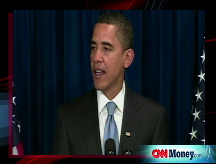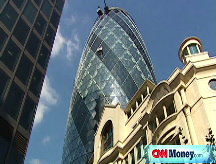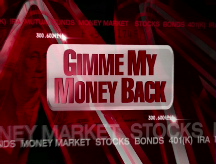Stocks knocked by recession fears
Wall Street slumps after weak job reports, company profit warnings and slumping oil prices.

NEW YORK (CNNMoney.com) -- Stocks slumped Wednesday after weak labor market reports and dour forecasts from Alcoa and Intel gave investors reasons to retreat after the recent rally.
The Dow Jones industrial average (INDU) lost 245 points after losing as much as 295 points earlier. The decline was equivalent to a drop of 2.7%. The Standard & Poor's 500 (SPX) index fell 3% and the Nasdaq composite (COMP) slumped 3.2%.
"We had rallied about 24% off the November 20 lows, so we saw some profit taking today, triggered by the employment reports, the lower oil prices and anticipation about the retail sales reports due tomorrow," said Chris Colarik, portfolio manager at Glenmede.
On Thursday, the nation's chain stores will be reporting December sales figures and the results are expected to be pretty dismal.
Stocks rallied Tuesday, recharging the recent advance that has lifted the S&P 500 by 8% in less than two weeks. But the gains petered out Wednesday as the day's news served as something of a reality check, said Steven Goldman, market strategist at Weeden & Co.
Alcoa's massive job losses and profit warnings from Time Warner and Intel added to the weakness. Tensions in the Middle East and the gas dispute between Russia and Ukraine were also in focus. Plunging oil and gold prices hit energy and metal stocks.
Investors were also at the mercy of seasonal factors, with more investors in the market now after a low-volume period surrounding the holidays, said Brian Battle, vice president at Performance Trust Capital Partners.
"Attendance is higher and people are paying attention again to the numbers," said Battle. "I don't think the jobs news is that surprising, but it's a reminder that we continue to face a global economic erosion."
He said some uncertainty about the timeline and content of an economic stimulus plan was also in the mix.
Looking forward, "I think the outlook for stocks has improved, but it's still not perfect," said Goldman. "We continue to see under performance in the banking sector and that's probably going to continue."
He said that on the upside, the November bear market lows will probably hold up, due to a number of technical factors and measures of investor sentiment.
"I think the bottom's been made," Goldman said. "It's just a matter of how much upside we have here."
Labor market: A pair of weak job market reports sparked worries ahead of Friday's big government report.
Private employers cut 693,000 jobs from their payrolls in December, according to the latest survey from payroll-services firm ADP. That was up from the revised 476,000 jobs lost in November and worse than what economists were expecting.
Planned layoffs at firms slipped 8.4% in December from the previous month but nearly quadrupled from a year ago, according to a separate report from outplacement firm Challenger, Gray and Christmas.
The government releases its December jobs report Friday. Employers are expected to have cut 475,000 jobs from their payrolls after cutting 533,000 jobs in the previous month, according to Briefing.com forecasts. The unemployment rate, generated by a separate survey, is expected to have risen to 7% from 6.7% in the previous month.
Ahead of that, the weekly jobless claims report is due Thursday.
Alcoa: The aluminum maker said late Tuesday it will cut 15,000 jobs, or 13% of its worldwide workforce, by the end of the year. Alcoa (AA, Fortune 500) also said it will halve capital spending and sell off four of its businesses as it cuts production in the wake of the global economic slowdown.
The Dow component plunged 10% Wednesday.
Corporate profits: Chipmaker Intel (INTC, Fortune 500) posted a second revenue warning Wednesday. The Dow component said weaker demand for its technology products will cut into its fourth-quarter revenue. Shares fell 6%.
CNNMoney.com parent Time Warner (TWX, Fortune 500) warned it will take about $25 billion in writedowns in the fourth quarter, leading it to post a loss. Shares fell over 6% Wednesday.
On the upside, Monsanto (MON, Fortune 500) rallied almost 18% after the world's largest seed company reported higher-than-expected fiscal first-quarter earnings and boosted its full-year profit outlook.
Other stock movers: A variety of financial stocks slumped, including Bank of America (BAC, Fortune 500), Citigroup (C, Fortune 500), JPMorgan Chase (JPM, Fortune 500) Goldman Sachs (GS, Fortune 500) and Morgan Stanley (MS, Fortune 500).
Oil prices declined 12%, sending energy stocks lower. Chevron (CVX, Fortune 500), Exxon Mobil (XOM, Fortune 500), Noble Energy (NBL) and Occidental Petroleum (OXY, Fortune 500) all fell in active trading.
Market breadth was negative. On the New York Stock Exchange, losers beat winners by four to one on volume of 2.08 billion shares. On the Nasdaq, decliners topped advancers by more than three to one on volume of 1.53 billion shares.
Other economic news: The nation's budget deficit will likely rise to a record $1.2 trillion, or 8.3% of GDP, in 2009, not including the cost of the Obama economic stimulus plan, the government said Wednesday.
On Tuesday, the Federal Reserve released its economic forecast along with the minutes from its last policy-setting meeting. In the minutes, the central bank said that GDP growth will slow this year, and that even with using unusual methods to try to help the economy, the outlook is going to remain weak for a while. The report also said unemployment will rise significantly into 2010.
Bonds: Treasury prices fell, raising the yield on the benchmark 10-year note to 2.49% from 2.45% Tuesday. Treasury prices and yields move in opposite directions. Yields on the 2-year, 10-year and 30-year Treasurys all hit record lows last month.
Lending rates improved. The 3-month Libor rate slipped to 1.40% from 1.41% on Tuesday according to Bloomberg.com. That was a 4 1/2-year low. Overnight Libor fell to 0.11% from 0.12%. Libor is a key bank lending rate.
Other markets: In global trading, Asian markets ended mixed. European markets slumped in the afternoon with the London FTSE down 2.6%.
European markets reacted to the Russia-Ukraine dispute as well, after the two nations said the supply of natural gas to Europe was completely shut off Wednesday. Each side blamed the other for the cut-off.
The dollar tumbled versus the euro and yen.
U.S. light crude oil for February delivery slumped $5.78 to settle at $42.80 a barrel on the New York Mercantile Exchange. Prices fell after a government report showed a bigger-than-expected surge in crude oil and gasoline stockpiles last week, reflecting the continued drop in demand. Prices have fallen over $100 per barrel in the last six months.
Oil prices, always sensitive to Middle East tensions, have risen over the last two weeks as the Israeli air and ground offensive has raged on.
COMEX gold for February delivery fell $24.30 to settle at $841.70 an ounce.
Gasoline prices rose 3.9 cents to a national average of $1.727 a gallon, according to a survey of credit-card swipes released Wednesday by motorist group AAA.
Talkback: Have you tried to do a mortgage work-out? Was it successful or a failure? E-mail mailto:realstories@cnnmoney.com and your story could be included in an upcoming article. ![]()





